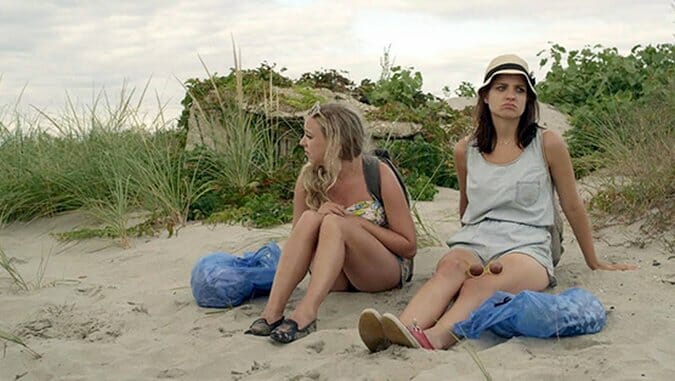Fort Tilden

Fort Tilden’s quite charming, though filmmakers Sarah-Violet Bliss and Charles Rogers never let their charmless subjects, acerbic artist Harper (Bridey Elliott) and spineless Peace Corps recruit Allie (Clare McNulty), gain too much of their audience’s sympathy. It’s a narrow line to walk: the mid-20s Williamsburg roommates have to seem vacuous enough to get stranded in “deep Brooklyn” after passively watching one of their bikes get stolen while on an 11-mile daytrip to the beach, but not so stupid that they can’t lob the occasional well-honed insult at a fellow human being or incisively dissect each other’s insecurities.
Unfortunately, the film’s uneven tone is largely the result of the filmmakers choosing to fudge this distinction—whether Harper and Allie are vapid and ineffectual incompetents or self-absorbed-but-insightful truth-tellers—depending on the scene. Considering this is a film about quarter-life crises, these fluctuations in maturity make sense to a point, but this blurring of how we’re supposed to perceive Harper and Allie isn’t helped by the fact that the tone of the film and the quality of the dialogue also vary scene to scene—even line to line. This film is a giant mood swing: at times in hysterics; at others distracted and impatient.
Overarching critiques aside, there are some very funny moments, like Harper throwing a copy of Infinite Jest on her couch to make her apartment “sex ready,” punctuated with a perfect little bit of business by Elliot where she double checks how “casual” it looks lying there. There are plenty throughout: secondary characters commenting on the girls’ rompers and Harper’s hat with various levels of shade; the girls purchasing a barrel off the street and, after deciding it’s too heavy to carry up their stairs, abandoning it in their apartment building’s common (and extremely narrow) foyer; Harper graphically waxing about being sexually aroused by evil cartoon fauna; etc.
But long stretches of the movie lack (funny) jokes entirely, as if a punch-up writer only got around to 30% of the dialogue. A mid-film shopping montage featuring Harper and Allie asking a series of rote questions about each other’s style falls flat, like the brainstorm session for Funny Things Williamsburg Hipsters Might Say And Do In A Discount Clothing Store In A Working-Class Brooklyn Neighborhood got cut short in production and nobody thought to reschedule it. This lack of interesting content especially drags after a similarly limp scene in which Harper and Allie—both of whom seem shallow and self-absorbed; neither of whom seem stupid—try to get iced coffee from a small bodega that clearly doesn’t sell iced coffee, but also after an incredibly sharp and interesting moment where Harper surveys the entire neighborhood only moments before and is “inspired” to start a new art project called “dollhouse ghetto.” This movie isn’t afraid to hang its two main characters out to dry as horrible people, which makes it weird when it occasionally chooses to present them as merely stupid, often in the service of half-assed jokes in half-assed scenes.
-

-

-

-

-

-

-

-

-

-

-

-

-

-

-

-

-

-

-

-

-

-

-

-

-

-

-

-

-

-

-

-

-

-

-

-

-

-

-

-








































